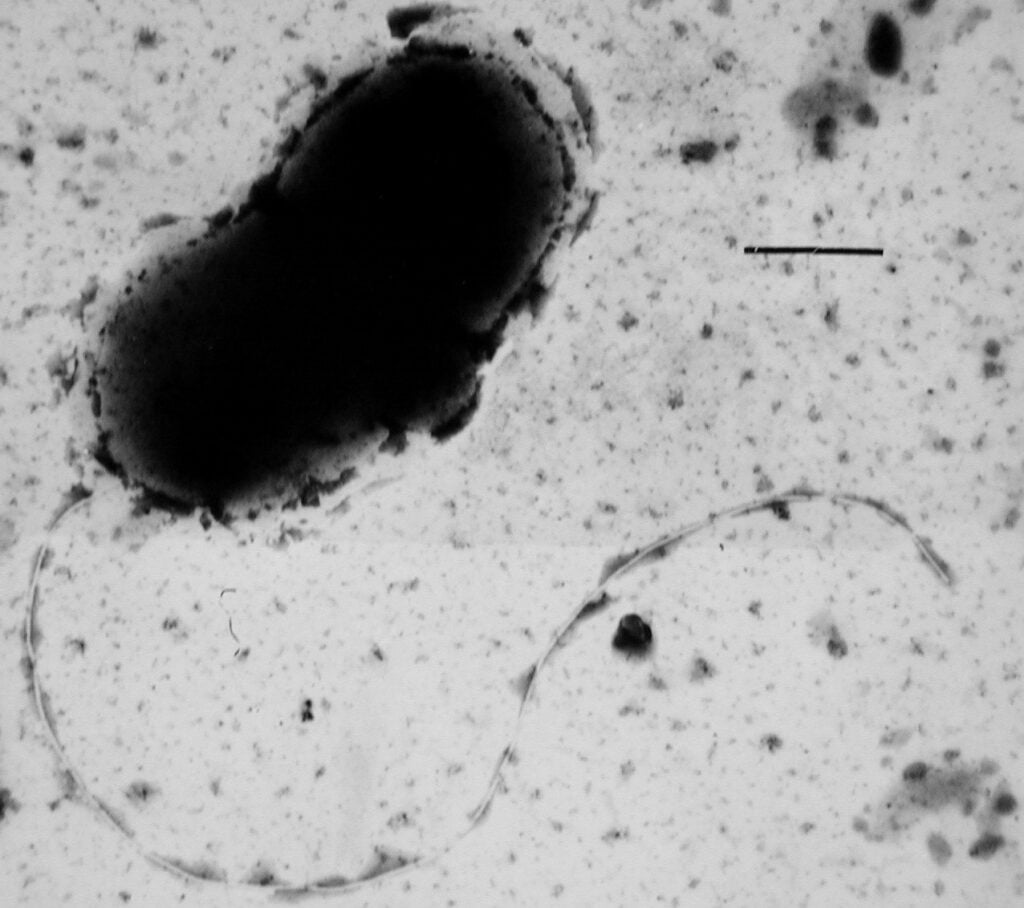Does Hot Water Kill Bacteria? Here’s 6 Things You Should Know

You probably don’t think about your water heater too often. As long as it’s working and you’ve got hot water, what is there to think about? As it turns out, there may be more to consider than you think. An improperly maintained water heater is a breeding ground for bacteria. This bacteria can get into your water supply and end up causing foul smells, as well as have an impact on your overall health. But how can you stop this from happening? Does hot water kill bacteria?
How Does Bacteria Get in a Water Heater And Does Hot Water Kill Bacteria?
Bacteria are present anywhere and everywhere. Some bacteria are dangerous to your health and wellbeing, while other bacteria are completely harmless. Although bacteria are all around us, some environments are more prone to certain types of bacteria than others.
Warm, wet places are breeding grounds for bacteria and an improperly-set water heater is ground zero. At the right temperature, bacteria are allowed to grow and multiply in droves right under your nose. Considering this, it’s very important to check your water heater semi-regularly and make sure it’s set to the right temperature at all times.
What Kind of Bacteria Grows in Water Heaters?

There are a few bacteria that are likely to grow in your water heater, but the most common is legionella.
Legionella is the bacteria that causes Legionnaires’ disease. You can get Legionnaires’ disease by inhaling microdroplets of legionella-contaminated water. Legionnaires’ disease is a severe type of pneumonia. It causes lung inflammation, head and muscle aches, high fevers, and sometimes bloody coughs. It’ll also give you chest pain, shortness of breath, and mental confusion as it worsens.
While Legionnaires’ disease can be treated, and it is not transmittable, it’s far from something you want to get. It can even be deadly to those with weakened immune systems and the elderly. Considering this, it’s important to make sure legionella bacteria can’t grow in your water heater.
Beyond legionella, your water heater can become infested with sulfate-reducing bacterium. When this happens, your water may have a distinct “rotten egg” or sulfur smell to it. This is wholly unpleasant and gets worse if not corrected.
Corrosion and rust in your water heater can also cause bacteria. You should do routine checks on the maintenance of your water heater. If it’s in need of repairs or if your water heater is leaking, don’t hesitate to call a professional.
How Do I Know If There Are Bacteria in My Water Heater?
If your water smells like rotten eggs, chances are its a bacterial issue. You may have too much magnesium in your water, or hydrogen sulfide gas. Beyond that, it can be hard to tell if there are bacteria in your water heater. Bacteria isn’t visible, meaning it could be present without you knowing.
Considering this, there isn’t really a way to know if there are bacteria in your water heater. You can, however, reduce the chances of bacteria in your water heater. The best way to reduce the chances of bacteria in your water heater is by paying attention to the heat settings. At too low a temperature, your chances of cultivating legionella and other bacteria are raised significantly. It’s important to learn the perfect temperature to maintain and make sure your heater stays that way.
What Is the Perfect Hot Water Heater Temperature?
First, let’s talk about the most deadly temperature for bacteria growth. Temperatures between 95°F and 115°F offer the perfect environment for legionella bacteria. This temperature range will not only encourage growth, but multiplication. Keeping your water heater in this temperature range for too long will cause a massive buildup of bacteria.
However, at 120°F, the bacteria stop multiplying. This temperature won’t kill the bacteria, though — it’ll just inhibit it. Legionella can still be transmitted at this temperature through the shower, the sink, or any other water source.
According to the American Society of Sanitary Engineering, you should set your water heater between 135 and 140°F. At this temperature, you’ll kill any legionella present and stop any more from growing. This high temperature will also kill bacteria besides legionella that may be present.
This may seem too hot at first, but there are steps you can take to make it more manageable. Besides, it’s much better than allowing bacteria to grow in your water heater. Bacteria in your water heater means putting your entire family at risk, especially because legionella can travel in airborne particles.
Changing the hot water tank temperature is easy and we have a step by step guide to show you how : How to Change Your Hot Water Heater Temperature In 6 Steps
The Risks of High Water Temperature
The only problem with turning the water heater between 135 and 140°F is the increased chance of scalding.
Your water will come out a lot hotter at this temperature and can scald you in just a few moments. You might consider installing an anti-scald device after turning the heat up. These are installed near the water heater’s outlet and mixes a little cold water with the hot water as it comes out.
This is especially important to do if you live with children or the elderly. They may accidentally burn themselves on the hot water, which can cause significant damage. Always let your family members know when you change the water heater’s temperature so they can be prepared for it.
Does Water Heater Temperature Change on its Own?
Even if you set your water heater to the perfect temperature, it may not stay that way. The water heater’s temperature may change as cold water circulates into it. It may also change if you have an old water heater, or one in need of maintenance. This makes it very important to check on your water heater’s temperature settings occasionally.
By keeping on top of your water heater’s temperature you greatly reduce the risk of bacteria and the dreaded rotten egg smell.
What If My Water Smells Like Rotten Eggs?
As we’ve touched on, there are a few different reasons your water may smell like eggs. Considering this, there are a number of solutions depending on what is causing the smell. One of the easiest solutions is raising the water temperature. By doing this, you’ll effectively destroy the bacteria that may be present in the tank but doing so can be very dangerous and there is an easier way to stop that smell.
Try a Chlorine Treatment
If your water has sulfate-reducing bacteria present, you might be able to fix it with a concentrated chlorination treatment. This puts a set amount of chlorine into the tank. However, this is only a temporary solution and will last for 1 or 2 weeks.
Install a Powered Anode Rod
Every water heater has a magnesium anode rod installed in it. This rod is installed to limit corrosion inside the tank and will only last a couple of years. If you want to solve this smell forever, you just need to install a Corro-Protec powered anode. This powered anode will kill the bacteria that create the rotten egg smell in only 24 hours and doesn’t require any maintenance.





What is the right temperature to kill bacteria?
If your water smells like rotten eggs, chances are its a bacterial issue. You may have too much magnesium in your water, or hydrogen sulfide gas. Beyond that, it can be hard to tell if there are bacteria in your water heater. Bacteria isn’t visible, meaning it could be present without you knowing.
The best way to reduce the chances of bacteria in your water heater is by paying attention to the heat settings. The perfect temperature to maintain and make sure your heater stays in great condition is 120F.
The best way to ensure a safe environment in your tank is to install a Corro-Protec powered anode rod. Give it 24 hours and you’ll be odour-free!
BUY ONE NOW!
Blog
How to Change Your Hot Water Heater Temperature In 6 Steps
Changing your hot water heater temperature is easy. However, before adjusting your hot water heater temperature, you should read our article : Hot Water Temperature: […]
Hot Water Temperature : Avoid Setting Your Water Too Hot
If your hot water temperature is set to 140 degrees Fahrenheit, it takes three seconds to burn your skin serious enough to require surgery. Three seconds isn’t long at all. […]

